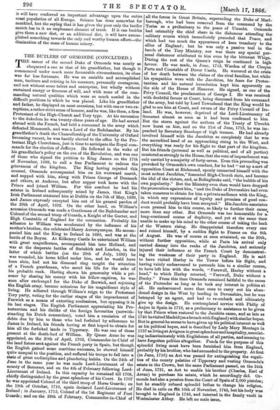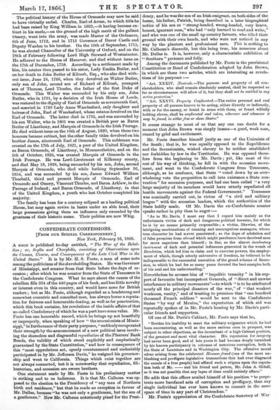THE BUTLERS OF 011.110NDE (CONCLUDED.)
The political history of the House of Ormonde may now be said to have virtually ended. Charles, Earl of Arran, to which title he had been raised by King William in 1693,—it having become ex- tinct in his uncle,—on the ground of the high merit of the gallant Ossory, went into the army, was made Master of the Ordnance, 6th of June, 1712, and in 1713 Governor of Dover Castle and Deputy Warden to his brother. On the 10th of September, 1715, he was elected Chancellor of the University of Oxford, and on the 28th of February following Lord High Steward of Westminster: He adhered to the House of Hanover, and died without issue on the 17th of December, 1758. According to a settlement made by him, his estates then passed to his sister, Lady Emilia Butler, and on her death to John Butler of Kilcash, Esq., who also died with- out issue, June 24, 1766, when they devolved on Walter Butler, only son of John, second son of Richard of Kilcash, youngest son of Thomas, Lord Thurles, the father of the first Duke of Ormonde. This Walter was succeeded by his only son, John Butler, who in 1791, by a decision of the Irish House of Lords, was restored to the dignity of Earl of Ormonde as seventeenth Earl, and married in 1769 Lady Anne Wandesford, only daughter and heiress of John, Earl of Wandesford, whose estates devolved on the Earl of Ormonde. The latter died in 1795, and was succeeded by his son Walter, who in 1801 was created a British peer as Baron Butler of Llanthony, and Marquis of Ormonde in the Irish Peerage. He died without issue on the 10th of August, 1820, when these two honours became extinct, but the other family titles devolved on his brother James, nineteenth Earl of Ormonde. This nobleman was created on the 17th of July, 1821, a peer of the United Kingdom, as Baron Ormonde, of Llanthony, in Monmouthshire, and on the 5th of October, 1825, was created Marquis of Ormonde in the Irish Peerage. He was Lord-Lieutenant of Kilkenny county, and died May 18, 1838, being succeeded by his son, John, second Marquis of Ormonde, who died while bathing September 26, 1854, and was succeeded by his son, James Edward William Theobald, third and present Marquis of Ormonde, Earl of Ormonde and Ossory, Viscount Thurles, and Baron Arklow, in the Peerage of Ireland ; and Baron Ormonde, of Llanthony, in that of the United Kingdom, a youth who last October completed his majority.
The family has been for a century eclipsed as a leading political House, but may again revive in lustre under an able head, their large possessions giving them an influence only exceeded by the greatness of their historic name. Their politics are now Whig.































 Previous page
Previous page